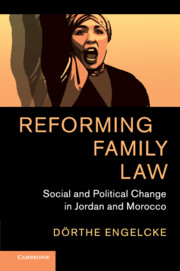Book contents
- Reforming Family Law
- Cambridge Middle East Studies
- Reforming Family Law
- Copyright page
- Dedication
- Contents
- Figures
- Tables
- Acknowledgments
- Note on Transliteration
- Acronyms
- 1 Introduction
- 2 Colonial Legal Legacies and State-Building
- 3 The Contemporary Legal Systems
- 4 The Impact of International Law
- 5 The Process of Family Law Reform in Jordan
- 6 The Process of Family Law Reform in Morocco
- 7 Contested Issues of Jordanian Family Law
- 8 Contested Issues of Moroccan Family Law
- 9 The Implementation of the 2004 Law
- 10 Conclusion
- Bibliography
- Index
- Series page
3 - The Contemporary Legal Systems
Published online by Cambridge University Press: 19 February 2019
- Reforming Family Law
- Cambridge Middle East Studies
- Reforming Family Law
- Copyright page
- Dedication
- Contents
- Figures
- Tables
- Acknowledgments
- Note on Transliteration
- Acronyms
- 1 Introduction
- 2 Colonial Legal Legacies and State-Building
- 3 The Contemporary Legal Systems
- 4 The Impact of International Law
- 5 The Process of Family Law Reform in Jordan
- 6 The Process of Family Law Reform in Morocco
- 7 Contested Issues of Jordanian Family Law
- 8 Contested Issues of Moroccan Family Law
- 9 The Implementation of the 2004 Law
- 10 Conclusion
- Bibliography
- Index
- Series page
Summary
- Type
- Chapter
- Information
- Reforming Family LawSocial and Political Change in Jordan and Morocco, pp. 66 - 86Publisher: Cambridge University PressPrint publication year: 2019



